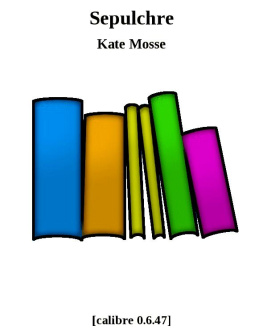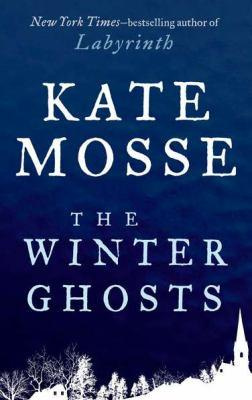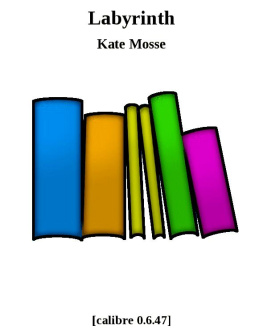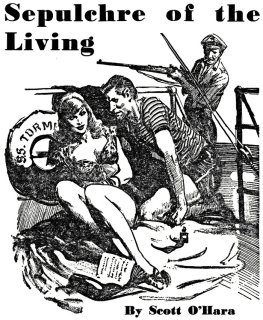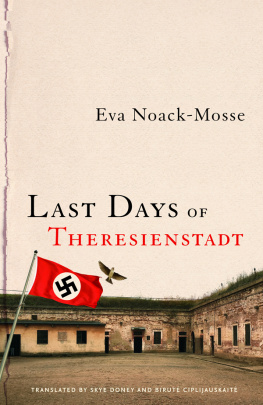Kate Mosse - Sepulchre
Here you can read online Kate Mosse - Sepulchre full text of the book (entire story) in english for free. Download pdf and epub, get meaning, cover and reviews about this ebook. year: 2008, publisher: Orion, genre: Art. Description of the work, (preface) as well as reviews are available. Best literature library LitArk.com created for fans of good reading and offers a wide selection of genres:
Romance novel
Science fiction
Adventure
Detective
Science
History
Home and family
Prose
Art
Politics
Computer
Non-fiction
Religion
Business
Children
Humor
Choose a favorite category and find really read worthwhile books. Enjoy immersion in the world of imagination, feel the emotions of the characters or learn something new for yourself, make an fascinating discovery.
- Book:Sepulchre
- Author:
- Publisher:Orion
- Genre:
- Year:2008
- Rating:5 / 5
- Favourites:Add to favourites
- Your mark:
- 100
- 1
- 2
- 3
- 4
- 5
Sepulchre: summary, description and annotation
We offer to read an annotation, description, summary or preface (depends on what the author of the book "Sepulchre" wrote himself). If you haven't found the necessary information about the book — write in the comments, we will try to find it.
Sepulchre — read online for free the complete book (whole text) full work
Below is the text of the book, divided by pages. System saving the place of the last page read, allows you to conveniently read the book "Sepulchre" online for free, without having to search again every time where you left off. Put a bookmark, and you can go to the page where you finished reading at any time.
Font size:
Interval:
Bookmark:
Sepulchre by Kate Mosse
First published in Great Britain in 2007 by Orion Books
Copyright (c) Mosse Associates Ltd 2007
www.orionbooks.co.uk
If, one dark, oppressive night, A Christian, moved by charity, Should bury your lauded corpse Behind some ancient ruin, As the eyes of the chaste stars Let fall their heavy lids, The spider will spin its webs there And the viper lay its eggs; Season upon season Your damned head will ring With the baleful cries Of wolves and rawboned witches, The groans of decrepit lotharios And conspirators' dark designs. CHARLES BAUDELAIRE, 1857
TRANSLATION (c) MOSSE ASSOCIATES LTD, 2OO7
The soul of another is a dark forest in which one must tread carefully. Letter, 1891 Claude Debussy
The true Tarot is symbolism; it speaks no other language and offers no other signs. The Pictorial Key to the Tarot, 1910 Arthur Edward Waite
Wednesday 25TH March 1891
This story begins in a city of bones. In the alleyways of the dead. In the silent boulevards, promenades and impasses of the Cimetiere de Montmartre in Paris, a place inhabited by tombs and stone angels and the loitering ghosts of those forgotten before they are even cold in their graves. This story begins with the watchers at the gates, with the poor and the desperate of Paris who have come to profit from another's loss. The gawping beggars and sharp-eyed chiffonniers, the wreath makers and peddlers of ex-voto trinkets, the girls twisting paper flowers, the carriages waiting with black hoods and smeared glass.
The story begins with the pantomime of a burial. A small paid notice in Le Figaro advertised the place and the date and the hour, although few have come. It is a sparse crowd, dark veils and morning coats, polished boots and extravagant umbrellas to shelter from the unseasonable March rain.
Lie stands beside the open grave with her brother and their mother, her striking face obscured behind black lace. From the priest's lips fall platitudes, words of absolution that leave all hearts cold and all emotion untouched. Ugly in his unstarched white necktie and vulgar buckled shoes and greasy complexion, he knows nothing of the lies and threads of deceit that have led to this patch of ground in the 18th arrondissement, on the northern outskirts of Paris.
Leonie's eyes are dry. Like the priest, she is ignorant of the events being played out on this wet afternoon. She believes she has come to attend a funeral, the marking of a life cut short. She has come to pay her last respects to her brother's lover, a woman she never met in life. To support her brother in his grief.
Leonie's eyes are fixed upon the coffin being lowered into the damp earth where the worms and the spiders dwell. If she were to turn, quickly now, catching Anatole unawares, she would see the expression upon her beloved brother's face and puzzle at it. It is not loss that swims in his eyes, but rather relief.
And because she does not turn, she does not notice the man in grey top hat and frock coat, sheltering from the rain under the cypress trees in the furthest corner of the cemetery. He cuts a sharp figure, the sort of man to make une belle parisienne touch her hair and raise her eyes a little beneath her veils. His broad and strong hands, tailored in calfskin gloves, rest perfectly upon the silver head of his mahogany walking stick. They are such hands as might circle a waist, might draw a lover to him, might caress a pale cheek.
He is watching, an expression of great intensity on his face. His pupils black pinpricks in bright, blue eyes.
The heavy thud of earth on the coffin lid. The priest's dying words echo in the sombre air.
'In nomine Patri, et Filii, et Spiritus Sancti. Amen. In the name of the Father, the Son, and the Holy Ghost.'
He makes the sign of the cross, then walks away.
Amen. So be it.
Lie lets fall her flower, picked freshly in the Parc Monceau this morning, a rose for remembrance. The bloom spirals down, down through the chill air, a flash of white slowly slipping from her black-gloved fingers.
Let the dead rest. Let the dead sleep.
The rain is falling more heavily. Beyond the high wrought-iron gates of the cemetery, the roofs, spires and domes of Paris are shrouded in a silver mist. It muffles the sounds of the rattling carriages in the Boulevard de Clichy and the distant shrieks of the trains pulling out from the Gare Saint-Lazare.
The mourning party turns to depart the graveside. Lie touches her brother's arm. He pats her hand, lowers his head. As they walk out of the cemetery, more than anything Lie hopes that this may be an end to it. That, after the last dismal months of persecution and tragedy, they might put it all behind them. That they might step out from the shadows and begin to live again.
But now, many hundreds of miles to the south of Paris, something is stirring. A reaction, a connection, a consequence. In the ancient beech woods above the fashionable spa town of Rennes-les-Bains, a breath of wind lifts the leaves. Music heard, but not heard.
Enfin.
The word is breathed on the wind. At last.
Compelled by the act of an innocent girl in a graveyard in Paris, something is moving within the stone sepulchre. Long forgotten in the tangled and overgrown alleyways of the Domaine de la Cade, something is waking. To the casual observer it would appear no more than a trick of the light in the fading afternoon, but for a fleeting instant, the plaster statues appear to breathe, to move, to sigh.
And the portraits on the cards that lie buried beneath the earth and stone, where the river runs dry, momentarily seem to be alive. Fleeting figures, impressions, shades, not yet more than that. A suggestion, an illusion, a promise. The refraction of light, the movement of air beneath the turn of the stone stair. The inescapable relationship between place and moment.
For in truth, this story begins not with bones in a Parisian graveyard, but with a deck of cards.
The Devil's Picture Book.
CHAPTER 1
Paris
Wednesday i6th September 1891
Lie Vernier stood on the steps of the Palais Gamier, clutching her chatelaine bag and tapping her foot impatiently.
Where is he?
Dusk cloaked the Place de l'Opera in a silky blue light.
Lie frowned. It was quite maddening. For almost one hour she had waited for her brother at the agreed rendezvous, beneath the impassive bronze gaze of the statues that graced the roof of the opera house. She had endured impertinent looks. She had watched the fiacres come and go, private carriages with their hoods up, public conveyances open to the elements, four-wheelers, gigs, all disembarking their passengers. A sea of black silk top hats and fine evening gowns from the showrooms of Maison Leoty and Charles Worth. It was an elegant first-night audience, a sophisticated crowd come to see and be seen.
But no Anatole.
Once, Lie thought she spied him. A gentleman of her brother's bearing and proportions, tall and broad, and with the same measured step. From a distance, she even imagined his shining brown eyes and fine black moustache and raised her hand to wave. But then the man turned and she saw it was not he.
Lie returned her gaze to the Avenue de l'Opera. It stretched diagonally all the way down to the Palais du Louvre, a remnant of fragile monarchy when a nervous French king sought a safe and direct route to his evening's entertainment. The lanterns twinkled in the dusk, and squares of warm light spilled out through the lighted windows of the cafes and bars. The gas jets spat and spluttered.
Around her, the air was filled with the sounds of a city at dusk, as day gave way to night. Entre chien et loup. The clink of harness and wheels on the busy streets. The song of distant birds in the trees in the Boulevard des Capucines. The raucous cries of hawkers and ostlers, the sweeter tones of the girls selling artificial flowers on the steps of the Opera, the high-pitched shouts of the boys who, for a sou, would blacken and shine a gentleman's shoes.
Next pageFont size:
Interval:
Bookmark:
Similar books «Sepulchre»
Look at similar books to Sepulchre. We have selected literature similar in name and meaning in the hope of providing readers with more options to find new, interesting, not yet read works.
Discussion, reviews of the book Sepulchre and just readers' own opinions. Leave your comments, write what you think about the work, its meaning or the main characters. Specify what exactly you liked and what you didn't like, and why you think so.

